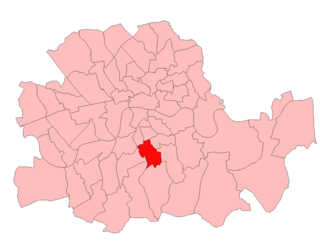
The 1918 United Kingdom general election was called immediately after the Armistice with Germany which ended the First World War, and was held on Saturday, 14 December 1918. The governing coalition, under Prime Minister David Lloyd George, sent letters of endorsement to candidates who supported the coalition government. These were nicknamed "Coalition Coupons", and led to the election being known as the "coupon election". The result was a massive landslide in favour of the coalition, comprising primarily the Conservatives and Coalition Liberals, with massive losses for Liberals who were not endorsed. Nearly all the Liberal MPs without coupons were defeated, including party leader H. H. Asquith.
Michael Carr is a British teacher, lecturer, and politician for the Liberal Democrats. Originally a teacher, Carr became active in politics as a Conservative councillor before joining the Social Democratic Party. After two unsuccessful general election candidacies, Carr won a sensational by-election victory in 1991 to become the Member of Parliament (MP) for Ribble Valley. His victory was short-lived as he lost the seat in the general election that followed a year later, and he twice failed to regain it.

Rossendale was a parliamentary constituency in the Lancashire, England. Created in 1885, it elected one Member of Parliament (MP) to the House of Commons of the Parliament of the United Kingdom, elected by the first-past-the-post voting system. When created it comprised the districts of Rawtenstall, Bacup, and Haslingden; Ramsbottom district was added to the constituency in 1950.

The 1943 Chippenham by-election was a parliamentary by-election held in England on 24 August 1943 for the British House of Commons constituency of Chippenham in Wiltshire.
Sir William Edge, 1st Baronet was a British Liberal, later National Liberal, politician and businessman.

Sir John Henry Maden was a British Liberal Party politician. He was elected Member of Parliament for Rossendale in 1892, resigning in 1900 by becoming Steward of the Manor of Northstead. He was again reelected for Rossendale in a 1917 by-election, retiring from politics when he lost his seat in the 1918 general election.
The 1920 Horncastle by-election was a parliamentary by-election held for the British House of Commons constituency of Horncastle in Lincolnshire on 25 February 1920. The seat had become vacant when the sitting Coalition Unionist Member of Parliament, William Weigall, who had held the seat since 1911, resigned upon being appointed Governor of South Australia.

Ernest James Young was a Liberal politician. He was a Councillor in Portslade and Member of Parliament for Middlesbrough East for one term in the 1930s. He was the first Headmaster of Harrow County School for Boys, Harrow, Middlesex from 1911 to 1919.

The 1922 Bodmin by-election was a parliamentary by-election for the British House of Commons. The constituency of Bodmin in Cornwall polled on 23 February 1922. The by-election was notable for the opposition Liberal Party gaining a seat from the Coalition-supporting Conservative Party.
The 1904 Rossendale by-election was a parliamentary by-election held for the British House of Commons constituency of Rossendale in Lancashire on 15 March 1904.
The 1900 Rossendale by-election was a parliamentary by-election held for the British House of Commons constituency of Rossendale in Lancashire on 13 February 1900.
The 1892 Rossendale by-election was a parliamentary by-election held for the British House of Commons constituency of Rossendale in Lancashire on 23 January 1892. It was one of the most important political contests in the struggle over Irish Home Rule and a pointer to the outcome of the 1892 general election which took place in July.

Maurice Alexander, was a Canadian barrister and soldier who later moved to England and had careers in the Diplomatic Service, English law and politics.
The 1917 Stockton-on-Tees by-election was a parliamentary by-election held for the House of Commons constituency of Stockton-on-Tees in County Durham on 20 March 1917.
The 1917 South Monmouthshire by-election was a by-election held on Thursday 12 July 1917 for the British House of Commons constituency of the Southern Division of Monmouthshire in South Wales.
The 1917 Edinburgh South by-election was a parliamentary by-election held for the House of Commons constituency of Edinburgh South in Scotland on 12 May 1917.
The 1917 Aberdeen South by-election was a parliamentary by-election for the House of Commons constituency of Aberdeen South comprising the local government wards in the southern part of the city of Aberdeen. The by-election took place on 3 April 1917.

The 1920 Camberwell North West by-election was a parliamentary by-election held for the British House of Commons constituency of Camberwell North West in the South London district of Camberwell on 31 March 1920.
Albert Taylor was a British trade unionist and political activist.









